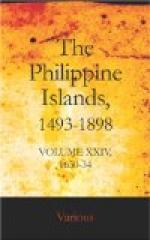CHAPTER XXXVII
Of the election of our father, Fray Alonso Baraona
Upon the arrival of the time set by the province, namely, the last day of October of the said year 1617, all the fathers who had a vote assembled, and discussed, as if in conflict, the question of electing such a head to the province; that he could settle, as far as he was able, the past quarrel, which had so upset the reputation of the order, by his authority, example of life, and morals. For in no time had it been more important for us to cut loose from our self-love and to fix our eyes on our mother, the order, which was suffering for her sons; and so that it might be understood that where there had been religious who had caused so evil an example, there were also those who could, by their example, edify a great community. According to this, father Fray Estacio Ortiz seemed very suitable to those who were present. He was the founder of the missions in Japon, and had always been known to be of a very religious life and had been highly esteemed by the civil government. Others declared that father Fray Alonso Ruiz, who was known to be a person of singular virtue, was the man who ought to fill that vacancy. Others, who had reasons therefor, sought another, as they had present father Fray Francisco Bonifacio. In order to know who he was, it sufficed to say that he had been prior of the convent of San Nicolas de Sugbu, which is for the natives, without anything ever being said in depreciation of his person. That, as was proper, was regarded as a singular case, and not less that he went free as did the children of Babilonia from the fire. He was a person who was always the model for all the Pintados.
The one who was discussed least was our father Baraona, for he was always humble by nature, and very free from pretensions, as he always thought of himself with great humility. But, as our Lord regarded him as provincial, He so managed affairs that votes were cast in his favor without special effort, and he was elected as provincial. On the last of October, then, endeavor was made, since there was nothing to do, to have the voting fathers return to their provinces and that the good of the province should be attempted, after deciding on a far-reaching reformation; for our father Baraona had excellent intentions, and to judge from these, it is to be believed that he would direct all things in the sight of God. In his own person he visited the province of Bisayas, which, as it was his own, he regarded with especial love. That visit was not a small exploit, when one considers the voyage. He always traveled at small expense, going in a champan, like any other and very ordinary religious. He was the one who sent most religious to Espana. Among them were the father visitor, Fray Agustin Mejia, who, arriving afterward at Peru, was there adopted and esteemed as his zeal and devotion deserved; the father definitor, father Fray Felipe Tallada; father Fray Andres de Ocampo, prior of Macabebe; father Fray Baltasar Andres; and father Fray Francisco de Cuellar. All died except father Fray Felipe Tallada, who afterward returned to the province of Pampanga, where he was a fine linguist.




